- Bernard Preston homepage
- Compost
- What Is a Worm Farm
What is a worm farm?
What is a worm farm gives details on locating food for your creepy crawlies; they consume their own weight every single day and double in number each month.
Worm farms have numerous important functions, several of which but not all may be pertinent to you. For example, unless you are a backyard chicken farmer, you may not be interested in them as a food source for your hens.
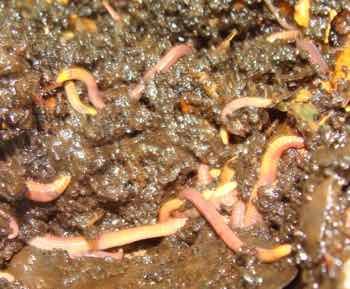
This page was last updated by Bernard Preston on 6th February, 2025.
Probably the single most important function of a worm farm is to safely dispose of your organic kitchen waste in a manner than is useful to you as a gardener; and relieves the burden of dumps to dispose of it in a way that is in keeping with the responsible maintenance of the environment.
Permaculture means working with nature, rather than against it; worms are to kitchen waste what vultures provide for dead animals in a place like the Kruger National Park, in South Africa. They clean up decaying matter in an environmentally friendly way.
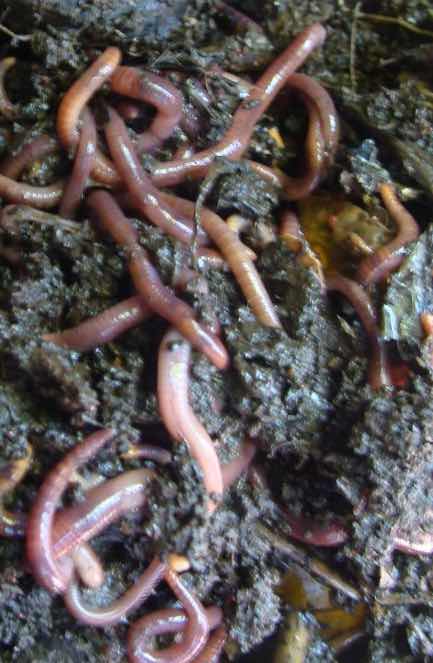
Secondly if you are an organic gardener committed to using only a minimum of fertiliser, then they will provide your plants with a rich source of nutrients; it comes firstly in the form of vermi-compost.
It is also known as worm-casts.
It is basically worm poo, rich in nutrients and bacteria that are especially beneficial to your seedlings, veggies and fruit trees.
It also provides a liquid manure known as vermi-leachate, often called simply worm wee.
This provides the thousands of nutrients that soon become deficient
in agricultural land; putting zinc and selenium back into your soil, for
example. We want virile plants like lettuce or broccoli to provide us
with those elements; otherwise we would need to take them in
supplements.
And lastly if you're after free range eggs and want to keep your own pasture-fed hens, then your surplus worms will provide a wonderful source of protein for the birds. Provided you supply them with enough food they will double in number every month.
Confined to a high density housing estate, all the worms do is copulate, feed and poop. So if you start with a 1000, within a year you will have over a million; that is the power of a geometrical progression, providing your hens with a weekly gourmet meal.
What is a worm farm?
What is a worm farm is a question you may be asking if you are a new organic gardener. This page is primarily about providing food for the hungry creepy crawlies; it is the essential limiting factor in their explosive growth.
Unlike the gardener's best friend, the earthworm, Fetida does not survive well in ordinary soil but they will thrive in a compost heap.
So one should think of them as an alternative to indigenous earthworms which are really soil engineers, tunneling through the soil, aerating it and allowing for good drainage.
Over and above your normal earthworms, their poo and wee make a wonderful organic fertiliser that can be worked into the soil or used as a top dressing.
Worm casts will not burn the roots of young seedlings but the wee must be diluted ten to twenty times. I like to apply it just after rain.
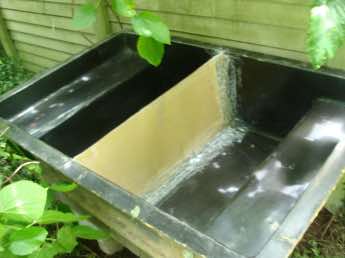
Any large container with a lid to keep out rats, other vermin and the rain will do; a double washtub would be fine or an old bath; as is this defunct fibreglass mold. It should have a divider as it must have two chambers for optimal use.
For some reason, many commercial varieties seem to come in layers; that is a complete waste of time in my opinion.
Elsewhere, I will describe the maintenance of your worm farm. In essence you drill a hole in each half for a drain plug to collect the wee, as it is called, and provide a lid; they like the dark.
It is not onerous except for the collection of sufficient food for a million worms; they consume their own weight every day, so you can imagine that finding sufficient rotten fruit and vegetables, compost and manure is quite a mission.
I have three large double worm farms, and I have to commit two to three hours once a week to feeding the creepy-crawlies, cleaning out the casts which go on the compost pile and around our plants. Frankly it is a dirty, unpleasant business; more about that later on this page.
Then it is best to empty the worm wee buckets several times a week in summer, otherwise they begin to smell; you must dilute the leachate before using it on your seedlings.
Organic plant food
Providing organic plant food for your spinach, winter squash, corn and green peas, just to mention a few is no simple matter; in fact it's back breaking work. But what is a worm farm does not play right into the hands of your local chiropractor and neurosurgeon; quite the contrary, if you do it right; the exercise is extremely beneficial and beats the local gym any day; you can actually see something achieved after all that action.
Let us talk about that for a moment; I am a retired DC. Do you know which section of the community, barring accidents, has the greatest amount of back trouble? Those who are couch potatoes. The lumbar spine and pelvis do not take kindly to long hours of sitting at a desk or in a motor vehicle.
Building a strong lower back can be done in many ways; the most important in my experience is a committed two minutes specific exercises every single morning before getting out of bed.
Then there is a daily walk or swim, or gardening on top of that, or some other activity; perhaps you like to play tennis or golf.
Whilst there is threat to the lower back when caring for your worm farm, and building a compost pile, in the end you will have a much stronger spine; and less pain than the person who sits at a desk all week and watches football on Saturday afternoon.
Your worm farm is a rich source of organic plant food for your vegetables and fruit trees, and ultimately for you located at the top of your garden's food-chain.
Dilute the worm wee several times and then use a watering-can to pour it around your plants, but preferably not on the leaves of those you eat; others think even that is okay.
Food for your worm farm
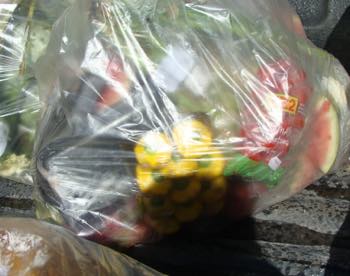
If you have a small garden and no desire to build a monstrosity, then finding food for your worm farm is a simple matter; all the organic matter from your kitchen will supply their needs.
But if you have a larger garden, and have no desire to use inorganic fertilizers, and want to feed the worms to your hens, then finding enough food for them is no small business.
You could place a bin at your gate and ask your friends and neighbours to bring their waste; or you might get the children in the local school involved, and discard their left over lunches for your little pets.
What is a worm farm is a subject that could consume all your time. Spending some time and energy learning how to wean off plastic is part of our thinking.
Or you can visit your local greengrocer or supermarket and collect their trash; it is not a pretty business, but it is effective. Half a dozen bags of waste will provide two or three large barrow loads of food for your worm farm.
The barrow on the left contains reasonably fresh food for the hens and, that on your right, decaying matter that is perfect for the worms. Getting it out of the literally dozens of plastic containers and wrappings is not pleasant.
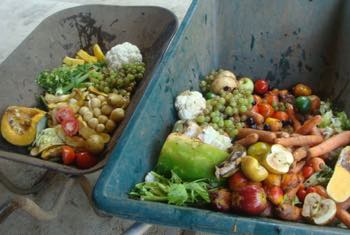
Much of the food, whilst having passed the sell by date, is still perfectly edible in fact; the hens love these sprouts and watermelon, but once they start to rot, they are suitable only for the worms.
Those potatoes in the left barrow incidentally went into the garden for seed. This year I was concerned to discover that our own moldy spuds gave a better return that the seed potatoes that we paid a mint for. So did a couple bunches of shallots
How to plant potatoes is only for those with a large garden, but I can assure you that a freshly dug new spud is a very different veg from what you get at the green grocer; also, new potatoes have a much lower glycemic index, read they do not produce the blood glucose rush that those from cold storage do. Grown in worm vermicompost and you have a winner.
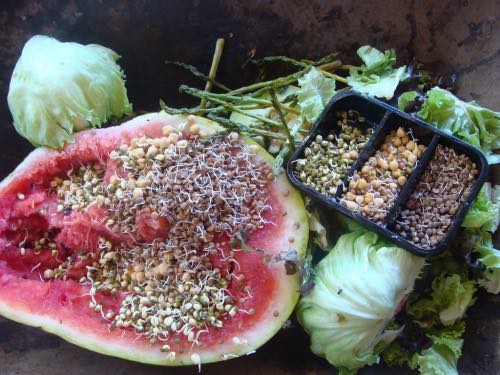
The local supermarket has a very high standard; these perfectly good young greens will go first to the hens; then at the end of the day, what they've not consumed will go to the worm farms; which in practice is almost nothing
They had huge crops this evening when I put them to roost.
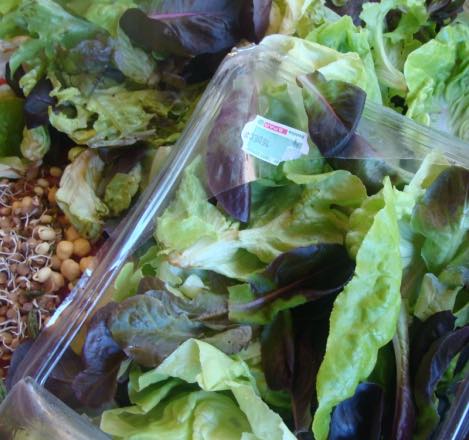
Amazingly, a tiny patch of lettuce like the one below will provide two fresh leaves a day from each of these six different varieties, enough for a green salad every day of the week; just add organic plant food from your compost pile, or a dessertspoon of vermicompost and very dilute worm wee to each seedling.
Add some spring onions, chives, a few herbs like parsley and sweet basil and you have lunch; a scoop of our authentic hummus recipe and a slice of our low GI bread will complete the meal.
Growing lettuce is not rocket science; neither is creating a divine green salad.
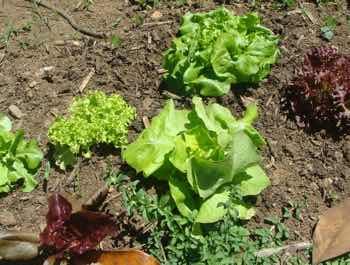
Newsletter
Our newsletter is entitled "create a cyan zone" at your home, preserving both yourself and Mother Earth for future generations; and the family too, of course. We promise not to spam you with daily emails promoting various products. You may get an occasional nudge to buy one of my books.
Here are the back issues.
- Lifestyle and ideal body weight
- What are ultra-processed foods?
- Investing in long-term health
- Diseases from plastic exposure
- Intensive lifestyle management for obesity has limited value
- A world largely devoid of Parkinson's Disease
- The impact of friendly bacteria in the tum on the prevention of cancer
- There's a hole in the bucket
- Everyone is talking about weight loss drugs
- Pull the sweet tooth
- If you suffer from heartburn plant a susu
- Refined maize meal and stunting
- Should agriculture and industry get priority for water and electricity?
- Nature is calling
- Mill your own flour
- Bake your own sourdough bread
- Microplastics from our water
- Alternative types of water storage
- Wear your clothes out
- Comfort foods
- Create a bee-friendly environment
- Go to bed slightly hungry
- Keep bees
- Blue zone folk are religious
- Reduce plastic waste
- Family is important
- What can go in compost?
- Grow broad beans for longevity
- Harvest and store sunshine
- Blue zone exercise
- Harvest and store your rainwater
- Create a cyan zone at your home
Three barrow loads like this will keep our worms happy. Some say they do no care for pineapple, citrus, onions and bread and it may be true; placing them on one half of your worm farm will soon tell; it would make a good rainbow worm farm experiment; if you have comments, add a comment below. I add wood ash to make it more alkali.
Many folk chop up the fruit and veg, but I'm into low PT; this already takes a few hours every week, and the worms don't appear to be too fussy; it may take a little longer but they consume every last morsel. You do have to break the skin of apples and butternut.
What is a worm farm? Just your kitchen waste will do. I always seem to carry things to extremes.
Add these scraps above the worms so they can work their way up leaving your vermicompost at the bottom to be dug out perhaps once a month.
For us this has been a big part of our green journey; yours will be different.
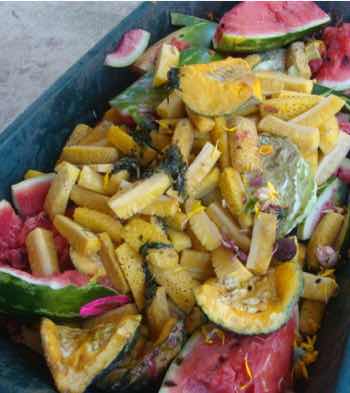
Worms love dung by the way. I bring back a large bag of cow manure when I go gliding; the beasts frequent the airfield during the week. Cow or horse, but not chicken waste; it is too acidic.
Cardboard soaked overnight in water provides the carbon they need.
The concept of worm farms fit in perfectly with operation end waste. Do not bin it; feed it to your pets.
Stink
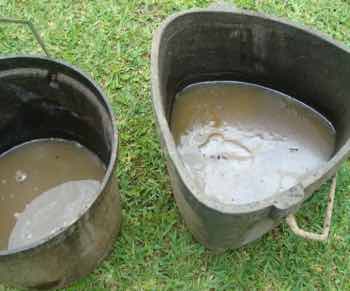
No question of it, when considering what is a worm farm, they stink in summer if you do not take precautions. The name of these worms is fetida. They are feeding on rotting matter; I do not include any animal tissue, but even decaying vegetables and fruit have an unpleasant smell. Do not place it too close to your own home or the neighbours.
The consensus is not to provide much cooked material; it will take longer for the worms to break it down, but dead birds and rats from a trap are fine.
Fetida worms love rotting meat too, but then you must keep the structure well away from your home.
I cover my worm farms with a layer of compost once the beasties have been fed; that settles the stink.
Do not prod with your garden fork into the rotting matter more often than you need to; it will open a can of worms and stink the place out. However they do need air, so just gently lifting the feed-stock without turning it is helpful.
The second important step is to remove the worm wee regularly, and make sure the bucket does not overflow; it certainly does stink in summer.
You can even empty it twice daily if you are energetic and are finding the stink unpleasant.
Dilute it several times and using a watering can pour it onto your garden for exuberant growth; my advice then is to put the hose onto the area and soak it in properly to reduce the smell and dilute the vermi-tea.
Does it actually make a difference to plant growth? Follow our rainbow worm farm experiments using corn in this initial instance to determine whether this organic feed actually is effective.
You can use it as an excellent foliar feed, but I do not on the lettuces. It's all part of our summer vegetable garden.
The worms' greatest enemy
The worms' greatest enemy is water; should rain be allowed to seep in expect your worms to drown and the waste to rot and stink. Fibreglassing the lid was a great step forwards.
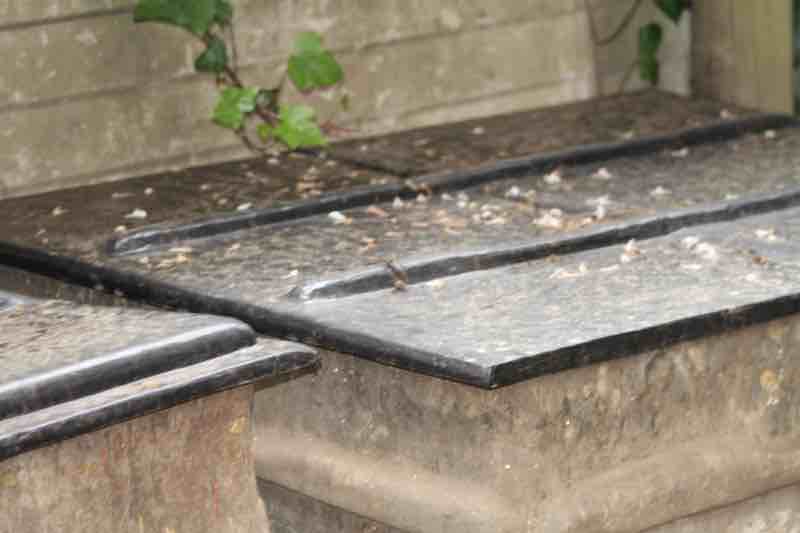
Free range eggs
Food for our hens, and free range eggs is to be honest the main driving force why I started investigating the question of what is a worm farm.
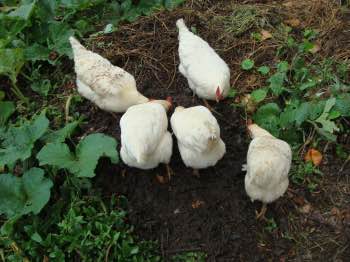
Here are five of our hens enjoying a gourmet meal from the worm farm;
they make a wonderful protein rich food for your chickens.
The organic plant food for our lettuces is just a very useful byproduct. I have not yet tried to doing any research with two patches, one fed with vermicompost and worm wee and the other only with humus from our build compost pile. That is in the pipeline; see the experiments page.
Free range eggs have a deep golden coloured yolk because of the nutrients; for example they have three times the omega-3.
You pay extra for them because they are worth much more, though there is a lot of dishonesty in the industry. A leading supermarket chain in South Africa markets free range eggs, but it turns out there are eight hens per square metre.
The standard in Australia is one bird per square
metre, and many think is should be far less dense than that; our twenty
chickens have 650 square metres to share; that is real free range. Add
to that the creepy-crawlies from our worm farms,
and they have the perfect food.
Free range eggs are not only more humane, but nutritionally and for their flavour highly advantageous; freshness is a factor too.
Do the yolks of your
supermarket eggs break when dropping them into the pan? I used to think that meant they were old; however that happens even to a fresh egg, I have found.
One of our hens is sitting on 17 eggs; we will not go counting chicks before they hatch but we are hoping to double our flock in three week's time.
Starting a compost pile
Add the worms casts from your farm, chicken litter from your hens and all the grass and plant cuttings that every garden produces in abundance; then starting a compost pile becomes a breeze. It is hard work though, as it needs to be turned every month or two. That's another of the many side benefits from your search about what is a worm farm; you don't have to join a gym to get exercise; and you will have something to show for all that effort.
Nutritious food is all about getting your garden soil ready. Your worm farm and compost heaps are the solution.
Why?
Why do I put myself through this gross business of feeding my creepy crawlies; having found out what is a worm farm, do I need to go through this every Saturday morning?
Is it just about organic plant food, free range eggs and to build a compost pile?
The answer has been slow in coming. Gradually I have realised it has just as much to do with getting a first hand grasp of the huge Earth-suffocating problem our planet has to do with plastic. And, yes, the non biodegradable single-use wrapping that this worm food comes in is totally gross.
I am gaining some understanding of why scientists are so concerned about the sordid pollution of our landfills and the oceans; what is a worm farm is my solution.
Then secondly, as you can see from the graphics above, much of this food waste could actually be eaten by starving humans. One third of the food produced by farmers is never actually eaten. The race to end waste is a huge initiative, and I see this collecting garbage to supply our what is a worm farm and my small part of gaining some understanding of the nature of the beast.
With not inconsiderable organisation, NGOs could come to an arrangement with supermarkets to collect their food that has passed its sell by date and get it to hungry people timeously; before what is a worm farm.
Enough ramblings about what is a worm farm and how to collect enough food for the little beasties; I hope you too are struggling with these issues of leaving a planet fit for our children's children to inhabit. It is my small part of what I call backyard permaculture; working with nature instead of against it.

Wean off plastic is an issue we all must face; it is a collective responsibility. My thought is that governments should add a heavy super tax to all non-biodegradable plastic; I see no other way that will force humans to look for alternative wrapping for our food.
You will have noticed that much of that food waste fed to our worms is items such as watermelon, butternut, and pineapple that comes in nature with a wrapping, its thick impermeable skin, which we have become too lazy to remove ourselves.
So we pay double for the supermarket to do the drudgery, forgetting that the nutritional value immediately starts dropping once food is exposed to air.
A watermelon will keep for ages; cut it and it deteriorates very quickly. Buy whole fruit and vegetables, share them with friends, family and the poor and finish them quickly rather than this shrink wrapped stuff that's choking the planet.
Our creepie crawlies would begin to starve, of course, but not this century I would suggest. Humans are stubbornly lazy and what is a worm farm food will continue to be readily available.
When browsing use right click and Open Link in New Tab, or you may get a bad gateway signal.
Hygiene
Hygiene incidentally is very important once you've answered the question what is a worm farm, and you're gathering their food. I wash my hands regularly, do not touch food or drink until all is complete, and then shower and scrub my hands very thoroughly when all is done.
This is about wellness, not picking up pathogens from the garbage. I have doing this every Saturday for three years without a single problem, but I am careful.
And I enjoy kefir every morning for breakfast; that provides the gazillions of probiotics that our colons need to overwhelm any pathogens that survive the journey through the small intestine by sheer weight of numbers.
If you don't know about kefir benefits, find out; it's so simple to brew your own probiotics, and there are reputedly over 30 different strains, compared to 4 or 6 in most supplements.
In answering what is a worm farm, you'll find it takes you down many other lanes, some of which may be cul de sacs for you.
Black Plague
What is a worm farm is one solution to the potential black plague conundrum in countries where garbage is not collected and properly processed.
The world's most serious invader is the brown rat; and it carries fleas, one of which MAY carry a bacterium called Yersinia pestis. It killed 50 million people in the Middle Ages.
I am experimenting with cooked waste food and to date have had no adverse effects. The worms love it, but there is more smell.
Worm farms are the solution to the management of household waste in regions where there is no garbage collection.
Wellness
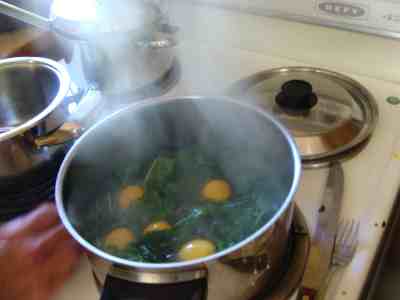
What is a worm farm of course is not just about saving the planet and feeding the hens; it's about wellness for us. The outdoor life, in what we call the Garden Cathedral, is superior in every way.
The vermicompost provides a wide range of substances that have been lost from modern soils; more, from the gut of the worm, comes a vast array of beneficial microbes and plant hormones for your seedlings. Our eyes can't see them, but just watch the hens; they have markedly superior eyesight.
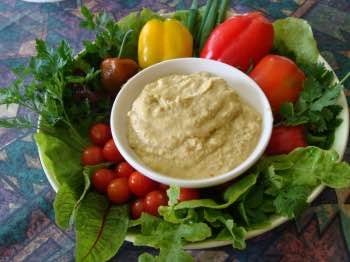
Here are three simple steps to well-being; each of these, with practice, take me only five minutes.
1. Grow your own spinach, it is simple and enjoy eggs Florentine regularly, particularly free range if you can find them. Even on a slice of our 100% wholemeal toast it gives only a very slight rise in blood sugar according to my experiments.
3. Bake your own low GI bread, using the left over hummus in the dough to lower the glycemic index. Use only 100% wholemeal flour.
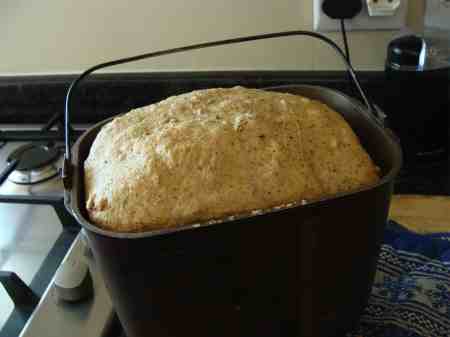
This just complements the question what is a worm farm?
Did you find this page interesting? How about forwarding it to a friendly book or food junkie? Better still, a social media tick would help.
- Bernard Preston homepage
- Compost
- What Is a Worm Farm
Address:
56 Groenekloof Rd,
Hilton, KZN
South Africa
Website:
https://www.bernard-preston.com